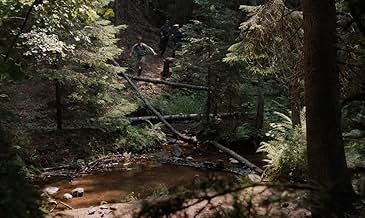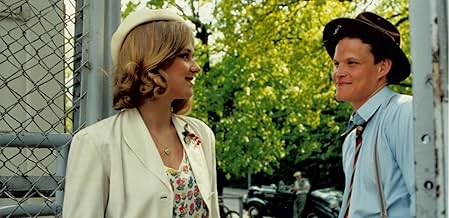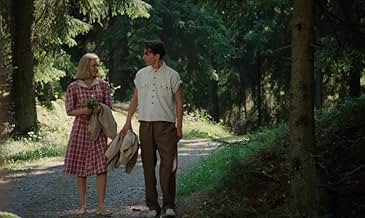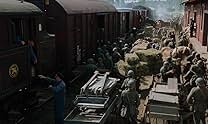1939
- 1989
- 3h 13m
IMDb RATING
6.1/10
1.1K
YOUR RATING
World War II through the eyes of a Stockholm waitress.World War II through the eyes of a Stockholm waitress.World War II through the eyes of a Stockholm waitress.
Featured reviews
Sweden was one of the safest countries during ww2 in Europe after Iceland and Portugal. A movie centered around the life of a woman during said war in Sweden needs a more interesting plot to compensate for the dullness of the events that concerned Sweden in that time.
That plot never happened. It's simply a story about a young woman and some sad realities of life that could have happened regardless of whether or not a war was ongoing
As a sort of documentary this would have been a 9, but they tried to make it a movie. 3h long as well. Not worth your time if you don't at least enjoy modern history.
That plot never happened. It's simply a story about a young woman and some sad realities of life that could have happened regardless of whether or not a war was ongoing
As a sort of documentary this would have been a 9, but they tried to make it a movie. 3h long as well. Not worth your time if you don't at least enjoy modern history.
Just take the time to really watch this movie. Great acting and styling. 5.6 rating is ridiculous.
1939 was a major project in the Swedish film industry. The Swedish people were invited to send in short descriptions of their own experiences during the war. The events depicted in the film are based on these stories. The main character, Annika, is based on a woman in real life, who travelled from Värmland to Stockholm to start a new life.
The film does create plausible images of what went on in Sweden during the war. The film also illustrates a time of transition, both for the world (from the old, safe environment to a new, unsecure one with prospects and dangers) and for the young people, who were forced to grow up quickly during this violent period of time. Everyone had to decide how to relate to the new world and what to do about their personal roots and beliefs. This is why I find the film so interesting.
I agree that 1939 can be considered slow at times, but I also happen to think that it is a tempo which suits the tale that is told. In my book, the key line is during one of the slower moments, when Annika's father says to Annika something along the lines of: "I am afraid of what's coming. Don't forget the old ways, Annika. Don't forget the way we used to live." Looking out over the meadows of his home, he realises that he is being left behind by the development, and that Annika and her peers are left at the helm. For me it is a thoroughly moving moment in the film. With the fast pace that we are living today, we would all do well to heed his plea.
This film didn't get the credit I think it merited, and at least for us Swedes 1939 should be considered an important film.
The film does create plausible images of what went on in Sweden during the war. The film also illustrates a time of transition, both for the world (from the old, safe environment to a new, unsecure one with prospects and dangers) and for the young people, who were forced to grow up quickly during this violent period of time. Everyone had to decide how to relate to the new world and what to do about their personal roots and beliefs. This is why I find the film so interesting.
I agree that 1939 can be considered slow at times, but I also happen to think that it is a tempo which suits the tale that is told. In my book, the key line is during one of the slower moments, when Annika's father says to Annika something along the lines of: "I am afraid of what's coming. Don't forget the old ways, Annika. Don't forget the way we used to live." Looking out over the meadows of his home, he realises that he is being left behind by the development, and that Annika and her peers are left at the helm. For me it is a thoroughly moving moment in the film. With the fast pace that we are living today, we would all do well to heed his plea.
This film didn't get the credit I think it merited, and at least for us Swedes 1939 should be considered an important film.
...should be around 7-8.
1939 is now available on Netflix worldwide having an audience 100 times more than in 1989 when was filmed. Quality is outstanding subsequent remastering.
The movie is maybe a bit too long, but not boring, great acting, interesting subject, reflecting actually Swedish people life during WWII, that being a neutral country was far better than life of French, Dutch, or Norwegian people. The only reason I don't give more than 8 stars is that finishes too suddenly letting you open to think about how might continue. What I liked especially is that everything happens during action is natural and not as in a soap movie.
This is a very decent movie, following the life of a waitress during the second world war in neutral Sweden. It's pretty cool to see how things went in Sweden in that time. I know this isn't a documentary, but still... Don't expect lots of action and suspense, but everyday struggles between a country girl and a city boy. Great acting and a good story...
Did you know
- TriviaFeature film debut of both Helene Egelund and Per Morberg.
- GoofsWhen Annika travels home to her parents for Christmas, you see an aerial view of the train going through the woods. In the lower right corner of the screen you can see a part of the landing railing of the helicopter from which the scene was filmed.
- Crazy creditsThe closing credits include an unusual job description: "Helena Olofsson-Carmback (as Helena Carmback) .... Shouting and whispering"
- ConnectionsEdited into Max Manus: Man of War (2008)
- How long is 1939?Powered by Alexa
Details
Box office
- Budget
- SEK 30,000,000 (estimated)
- Runtime
- 3h 13m(193 min)
- Sound mix
- Aspect ratio
- 1.66 : 1
Contribute to this page
Suggest an edit or add missing content

































